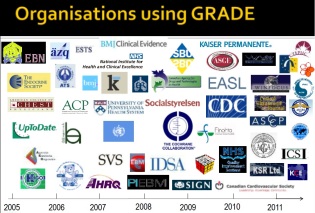Cochrane through the eyes of Google Trends
By Lewis Timimi, Work Experience at CSzG
Google is used so frequently and widely across the world that it has, in recent years, become a great tool for monitoring public interest. Jumping on the back of this, Google launched its own free service, which publishes a range statistics on popular Google searches, called Google Trends. Using Google Trends, it’s possible to see how interest in a specific subject has changed, worldwide, over almost 10 years (data starts from 2004). But can Google Trends tell us anything about online interest in Cochrane?
Well, we searched for a range of different Cochrane related phrases through Google Trends. The results were pretty consistent. They showed a steady decline in the number of searches for Cochrane, both across the UK and worldwide. In fact, searches for “Cochrane library” had decreased by around 75% since the start of 2004. It doesn’t sound too good. Read the rest of this entry »
Is Google a reliable tool for trial searches?
By Beth Adams, Work Experience at CSzG
There are around 91 million Google searches done across the world each day. So it’s needless to say it’s a huge part of day to day life, as well as the “go to” place for information. But when we search, can we just presume we are seeing all the possible results?
To test Google’s reliability, we set out to investigate the yield of search terms across all Google search engines.
We selected 11 phrases, chosen for relevance, currency, and possible controversial connotations including, ‘randomized’ and ‘randomized and schizophrenia’ for the theme of randomized trials, to have both a general and specific search. Then, we searched each phrase on the 137 Google sites across the world on the same day (7th – 8th July 2013). This allowed us to record the number of results on each of the sites to work out the comparative percentages. You’d expect them to be consistent and reliable, but were they? Read the rest of this entry »
Day 4: Solving the review puzzle and pulling it all together for your fans
Everyone’s a little sleepy after the course meal and chatting deep into the night over a glass of wine. Yesterday’s topics were heavy, the heaviest of the four days in fact. Today is all about the write up, putting all the pieces of the puzzle together to create a manageable picture for the public as well as clinicians (or whoever your consumers are); the pieces being everything from the previous three days – setting the topic, searching and statistics.
Part of the ‘pulling together’ involves summaries, lots of summaries in table, text and stats form to make your discoveries legible for members of the public. This is one of the most important things to keep in mind. How else do we get the people we are aiming to raise the awareness and knowledge of to read our reviews? Read the rest of this entry »




